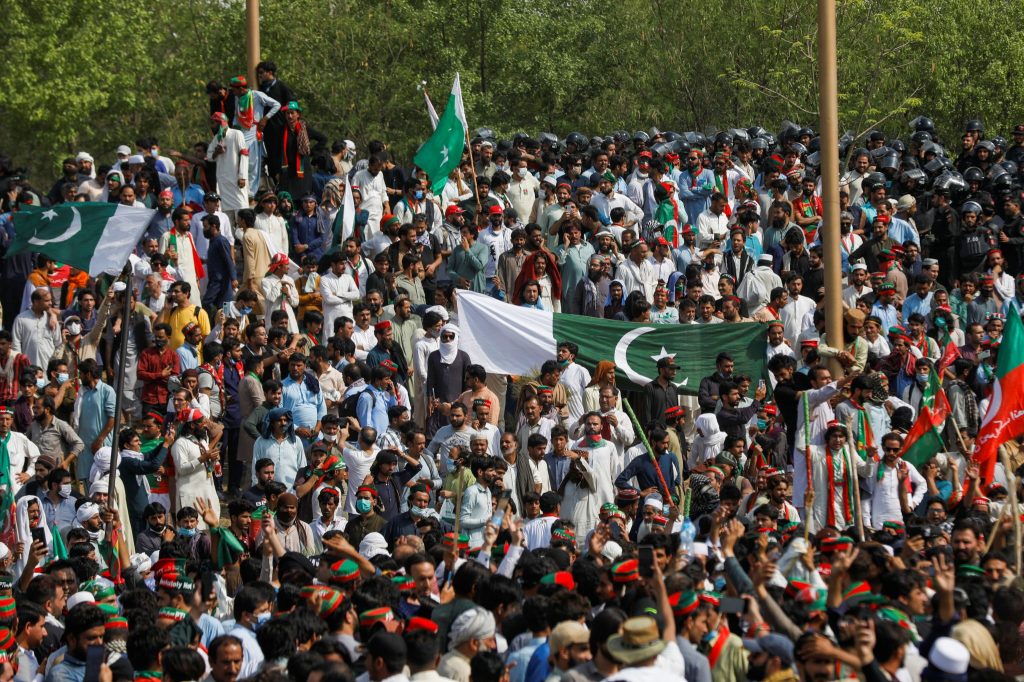Pakistan found itself in an economic crisis in 2023. Inflation raged around 40 per cent, power shortages
were frequent, while exports, remittances and foreign direct investments all dwindled. Political conflict
intensified and the military increased its involvement in both economic and political affairs.
Pakistan also remains in the throes of a constitutional crisis, with Punjab and Khyber-Pakhtunkhwa — two major provinces — failing to hold elections within the stipulated 90-day period after their assemblies were dissolved. Former prime minister Shehbaz Sharif’s national coalition, which assumed power after ousting former prime minister Imran Khan through a no-confidence vote, decided to call fresh elections in February 2024.
Anwar ul Haq Kakar — a minor and novice politician from Balochistan reportedly favoured by the military for publicly defending military actions against Baloch nationalists — was selected to lead the central caretaker government.
The economy and the Pakistani rupee struggled as a result of profligate spending by the Khan government. The slow-footed and inept handling of the exchange rate by the subsequent coalition government compounded these economic woes. The absence of strong fiscal policy and budget discipline resulted in a delayed agreement with the International Monetary Fund (IMF) for a new economic recovery program.
Annual remittance flows to Pakistan dropped by nearly US$4 billion. Even the promised US$10 billion flood relief failed to materialise as donors questioned Pakistan’s ability to surmount its self-created obstacles to economic growth
To bolster the Sharif and later the caretaker government’s efforts to revive the economy, the Chief of Army Staff, General Asim Munir was inducted into a new central body — the Special Investment Facilitation Council — in June 2023. This body was tasked with identifying external financial sources and their allocation for development through strategic investments.
The Special Investment Facilitation Council also included provincial chiefs. But without domestic policy changes and institutional reforms, such initiatives typically fail to produce rapid or sustainable results. But, surprisingly, the IMF agreed to release the second tranche of its new $3 billion loan. Questions arise as to whether the renewed transactional relationship with the United States was a key factor in the agreement.
The economy and investment flows were hindered in part by a surge in terrorist incidents in Pakistan. The increased terrorist activity was fuelled in part by dissatisfaction with the lack of economic and political development in the former Federally Administered Tribal Areas. In 2023, Pakistan witnessed 124 major attacks, prompting the government to conduct a massive expulsion of Afghan refugees deemed ‘undocumented’. Many of the expelled were children with Pakistani citizenship by birthright.
Political unrest in the country triggered nationwide protests by followers of Khan’s Pakistan Tehreek-e-Insaf party (PTI) in May after his arrest by paramilitary rangers. Unprecedented protest demonstrations targeted military installations. In response to the attacks, the coalition government and the army arrested up to 10,000 people and called for military trials of civilians. This led to more protests against the infringement of civilians’ constitutional rights.
The removal of a large number of serving and retired military officers — with limited details being shared about the proceedings against them — fuelled rumours of divisions within the military. Amid the upheaval, a new alliance seemed to have emerged between the military and the Pakistan Muslim League (Nawaz) party.
Senior leaders of the PTI have been sent to jail. Major office bearers disappeared then reemerged only to deliver public statements, resignations and written denunciations of the PTI and its protests. Those compliant with this approach were spared jail, while those that refused to follow this script remained in jail, facing seriatim charges even after securing bail from higher courts.
Political arrests and disappearances persisted, despite protests from international human rights organisations and US lawmakers. By the end of November 2023, the push to eliminate the political presence of the PTI picked up steam and the Election Commission of Pakistan urged the party to conduct intra-party elections or risk having to forfeit its election symbol, a cricket bat associated with Khan’s sporting career. The Election Commission of Pakistan then proceeded to annul the subsequent intra-party elections and took away Khan’s bat symbol.
Even if the February 2024 elections in Pakistan proceed without a hitch and under tight military observation, past experience suggests that pre-election day interference is likely. Changing the rules for intra-party elections, assigning compliant officials to oversee the electoral process and discreet persuasion by intelligence agencies all help guide an election before the votes are cast. A less than fair election might result in a hung parliament, allowing the dominant military to engineer Pakistan’s politics and economy.
Two contrasting scenarios may emerge. The first involves a deeper economic and political crisis — akin to the situation in Indonesia after the 1998–99 financial collapse — leading to a reduction of the military’s power. The second scenario would be a revival of the coup culture that leads to another period of military rule. The latter may be avoided if the military finds a reliable political partner. If not, then uncertainty will continue to wrack Pakistan, with its attendant economic costs.
Shuja Nawaz is Distinguished Fellow at the South Asia Center at the Atlantic Council, Washington DC and Author of ‘The Battle for Pakistan: The Bitter US Friendship and a Tough Neighborhood’.


Pakistan continued to face an economic crisis in 2023, triggered by high inflation and intensified political conflict, including military involvement in government affairs. Despite efforts to resolve the crisis, including military participation in a financial council and a new IMF loan, obstacles such as nationwide political protests, persistent terrorist incidents, and political arrests persisted, leave the country in a state of uncertainty.